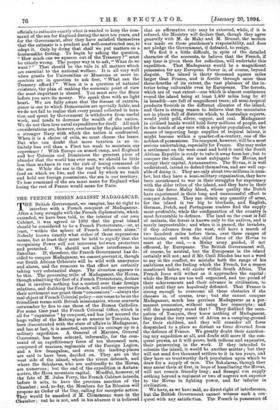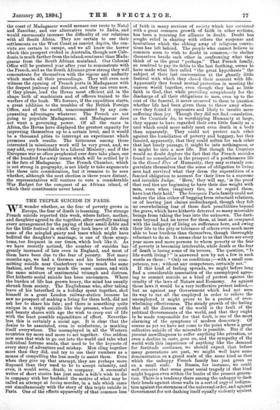'TILE FRENCH DESIGN AGAINST MADAGASCAR. T HE British Government, we imagine,
has no right to interfere with a French conquest of Madagascar. After a long struggle with the French diplomatists, which -extended, we have been told, to the interior of our own Cabinet, it was agreed in 1890 that the great island should be considered to be a French Protectorate,—or, at least, 'within the sphere of French influenee alone." Nobody knows exactly what either of those expressions means, but at least they must be held to signify that the recognising Power will not intervene between protectors and protected. We should not allow interference in Zanzibar. If, therefore, the French Government has de- cided to conquer Madagascar, we cannot prevent it, though our South African Colonists will be wild with annoyance and alarm, and the rumours to that effect are certainly taking very substantial shape. The situation appears to be this. The governing tribe of Madagascar, the Hovas, though admitting the fact of a French Protectorate, declare 'that it involves nothing but a control over their foreign relations, and disliking the French, will neither encourage their settlement nor grant them "concessions"—always the real object of French Colonial policy—nor cease to be on the friendliest terms with British missionaries, whose converts -outnumber by five to one those of the Roman Catholics. For some time past the French Colonial Office, which is all for " expansion " by conquest, and has just secured the huge valley of the Mekong as an annexe to Tonquin, has been discontented with the state of affairs in Madagascar, and has at last, it is asserted, screwed its courage up to a military expedition. A General of Marines, General -Couronnat, has been selected, informally, for the com- mand of an expeditionary force of ten thousand men, • composed of marines, regiments of the Foreign Legion, and a few Senegalese, and even the landing-places -are said to have been decided on. They are on the -west side of the island, where the rivers debouch, and where the Sakalavas, who are unfriendly to the novas, are numerous ; but the end of the expedition is Antana- narivo, the nova mountain capital. Mindful, however, of the fate of M. Jules Ferry, the French Cabinet intends, before it acts, to have the previous sanction of the Chamber ; and, to-day, the Members for La. Reunion will propose an Order of the Day, calling for energetic action. They 'Would be smashed if M. Clemeneeau were in the Chamber; but he is not, and in his absence it is believed that an affirmative vote may be extorted, while, if it is refused, the Ministry will declare that, though they agree generally with M. de Mahy and M. Brunet, the motion was made on those gentlemen's responsibility, and does not pledge the Government, if defeated, to resign. We find it a little difficult, in spite of the detailed character of the accounts, to believe that the French, if any time is given them for reflection, will undertake this expedition. That Madagascar would be a magnificent possession for any European Power is, of course, beyond dispute. The island is thirty thousand square miles larger than France, and is fertile through more than three-fourths of its extent, the vast plateaux of the in- terior being culturable even by Europeans. The forests, which are of vast extent—one which is almost continuous round the island being at least 1,400 miles long by 40 in breadth—are full of magnificent trees; all semi-tropical products flourish in the different climates of the island, and there is strong reason to believe that the mountains are in places full of districts which, to Australian experts, would yield gold, silver, copper, and coal. Madagascar in civilised hands would hold forty millions of people, and in the hands of any race with a surplus population, or the means of importing large supplies of tropical labour, it might become within a quarter-of-a-century, one of the noblest of possessions. Its conquest, however, will be a most serious undertaking, especially for France. She may make a settlement on the west coast and hold it until the South African Republic is ready to take it away from her ; but to conquer the island, she must subjugate the Hovas, and occupy their capital, Antananarivo. The Hovas, it is well understood, intend to defend themselves, and are well cap- able of doing it. They are only about two millions in num- ber, but they have a semi-military organisation, they have been accustomed to war in their struggles for supremacy with the older tribes of the island, and they have in their veins the fierce Malay blood, whose quality the Dutch have experienced in their long and unsuccessful effort to conquer Acheen. They can obtain any quantity of arms, for the island is too big to blockade, and English, German, Dutch, and Portuguese traders find -the supply most profitable, while the configuration of the country is most favourable to defence. The land on the coast is full of malaria, the forest is known only to the natives, and is nearly impenetrable ; and when it is passed, the invaders, if they advance from the west, will have a march of two hundred miles before them, over three ranges of mountains, and with the chief force of the Hovas to meet at the end, — a Malay army guided, if not officered, by Europeans. The British Government will, of course, be neutral, but the Europeans in the island certainly will not ; and if Mr. Cecil Rhodes has not a word to say in the conflict, we mistake both the range of his ambitions and the feeling which the French, for a reason mentioned below, will excite within South Africa. The French force will wither as it approaches the capital ; while the Hovas are too well organised, and too proud of their achievements and their advance in civilisation, to yield until they are hopelessly defeated. That France is strong enough to overcome all these obstacles if she chooses is, of course, true ; but she cannot conquer Madagascar, much less garrison Madagascar as a per- manent possession, without using her conscripts ; and will the peasantry stand that ? They disliked the occu- pation of Tong uin, they know nothing of Madagascar, they dread the very name of Africa as a camping-ground for their children, and they will consider all force despatched to a place so distant as force diverted from the defence of France. We greatly doubt their sanction- ing any expedition at all, and doubt still more if the con- quest proves, as it will prove, both tedious and expensive, their persevering in the work. If they intended to colonise the island, it would be another matter ; but they will not send five thousand settlers to it in ten years, and they have no trustworthy dark population upon which to draw for a supply of men. The Sakalavas, though they may assist them at first, in hope of humiliating the Hovas, will not remain friendly long ; and Senegal can supply nothing beyond a regiment or two of negroes not superior to the Hovas in fighting power, and far inferior in civilisation.
We have, as we have said, no direct right of interference, but the British Government cannot witness such a con- quest with any satisfaltion. The French in possession of the coast of Madagascar would menace our route to Natal and Zanzibar, and our alternative route to India, and would enormously increase the difficulty of our relations with all South Africa. They are certain to use their settlements on the West Coast as convict depots, the con- victs are certain to escape, and we all know the horror which this prospect evoked in Australia, though new Cale- donia is much farther from the island-continent than Mada- gascar from the South African mainland. Our Colonial Office will be pestered year after year to remonstrate with the French, and as the South Africans grow strong they will remonstrate for themselves with the vigour and audacity which marks all their proceedings. They will even now witness the opening of French ports in Madagascar with the deepest jealousy and distrust, and they can even now, if they please, lend the Hovas most efficient aid in the shape both of machinists and of officers trained to the warfare of the bush. We foresee, if the expedition starts, a great addition to the troubles of the British Foreign Office, and of the world, unaccompanied by any com- pensating advantages whatever. The French are not going to populate Madagascar, and Madagascar does not want a governing power. Of all the races in Africa, the Hovas have displayed the greatest capacity for improving themselves up to a certain level, mid it would be a thousand pities to interrupt an experiment which promises such results. The bitterness among those interested in missionary work will be very great, and, we may add, very formidable to a Liberal Ministry; and if the European war so often prophesied ever does take place, one of the hundred far-away issues which will be settled by it is the fate of Madagascar. The French Chamber, which is not strong in geography, is not likely to take arguments like these into consideration, but it remains to be seen whether, although the next election is three years distant, the representatives will venture to vote a considerable War Budget for the conquest of an African island, of which their constituents never heard.



































 Previous page
Previous page